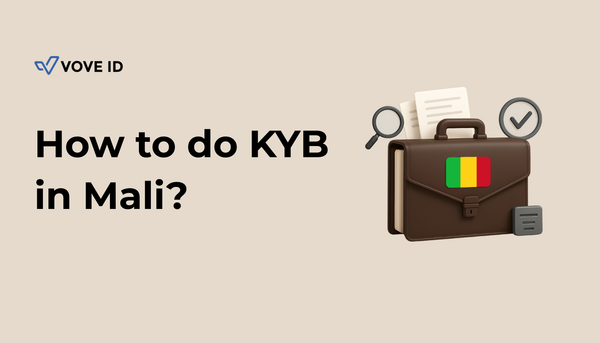AML Compliance in France: 2025 Guide for Fintechs and Regulated Businesses
Discover the 2025 AML compliance landscape in France. Learn about regulators, FATF alignment, enforcement, and how fintechs can streamline onboarding with VOVE ID.

France is one of Europe’s most active jurisdictions when it comes to Anti-Money Laundering (AML) and Countering the Financing of Terrorism (CFT) compliance. The country combines strict domestic laws with European Union (EU) directives and regulations, making it a central hub for compliance developments. For fintechs, digital wallets, crypto platforms, and other regulated businesses, mastering AML compliance in France is essential to gaining regulatory trust and scaling sustainably.
This article explores the current AML framework in France, key regulators, sector-specific risks, enforcement trends, and practical guidance for businesses, with a focus on how VOVE ID supports digital compliance.
France’s AML Regulatory Framework
French AML laws are anchored in the Code Monétaire et Financier (CMF), regularly updated to align with EU directives and Financial Action Task Force (FATF) standards. Key pillars include:
- Customer Due Diligence (CDD): Obligations for banks, payment firms, fintechs, and other entities to verify customer identity, assess risk, and monitor transactions.
- Know Your Business (KYB): Verification of corporate clients, including beneficial ownership disclosure.
- Suspicious Activity Reporting (SARs): Obliged entities must report to TRACFIN (Traitement du renseignement et action contre les circuits financiers clandestins), France’s financial intelligence unit.
- Enhanced Due Diligence (EDD): For politically exposed persons (PEPs) and high-risk customers.
Recent developments include:
- 2024 Update to the CMF: Implementing new requirements for digital asset service providers (DASPs), reflecting the EU’s Markets in Crypto-Assets Regulation (MiCA).
- EU AML Regulation (AMLR) and Sixth AML Directive (AMLD6): France is fully aligning with the upcoming EU-wide AML authority (AMLA), strengthening cross-border supervision.
Key Regulators
- TRACFIN – financial intelligence unit responsible for receiving and analyzing suspicious transaction reports.
- Autorité de Contrôle Prudentiel et de Résolution (ACPR) – supervises banks, insurers, and payment institutions.
- Autorité des Marchés Financiers (AMF) – regulates investment firms, fund managers, and securities markets.
- Ministry of Economy and Finance – oversees broader financial policy and AML transposition into national law.
France and the FATF
France is a founding member of the Financial Action Task Force (FATF) and underwent its latest Mutual Evaluation in 2022, which confirmed strong effectiveness across most recommendations. France is considered largely compliant with nearly all FATF recommendations, with high effectiveness in supervision and international cooperation. Ongoing monitoring ensures new risks, especially from digital assets, are addressed.
Sector-Specific AML Risks
Certain industries face heightened AML scrutiny in France:
- Fintech & Payment Services: Due to cross-border transactions and rapid onboarding, fintechs must apply robust eKYC and ongoing monitoring.
- Crypto & DASPs: France was one of the first EU states to license crypto providers under the AMF/ACPR regime. All DASPs must register and comply with CDD, KYB, and transaction monitoring obligations.
- Real Estate & Luxury Goods: High-value assets are regularly used for laundering. Real estate agents, notaries, and luxury dealers are obliged entities.
- Legal & Accounting Professions: As designated non-financial businesses and professions (DNFBPs), lawyers and accountants are under TRACFIN’s supervision.
Enforcement Trends
French authorities have stepped up enforcement:
- In 2023, prosecutors intensified investigations into crypto platforms for weak CDD controls, including high-profile probes involving Binance’s French operations.
- Luxury goods seizures tied to money laundering cases have been reported, with assets valued in the tens of millions of euros.
- The ACPR and AMF have imposed compliance penalties on banks and investment firms failing to identify ultimate beneficial owners (UBOs).
These actions highlight the importance of robust identity verification, KYB, and continuous monitoring.
Challenges for Businesses
- Complex Regulatory Environment: Navigating both French CMF rules and EU directives can be resource-intensive for startups.
- High Compliance Costs: Maintaining in-house AML teams and systems strains early-stage companies.
- Technology Gaps: Many businesses lack advanced digital identity verification or automated monitoring solutions.
Best Practices for AML Compliance in France
- Implement risk-based CDD and KYB frameworks.
- Leverage digital identity verification tools (eKYC, biometric checks, document verification).
- Ensure ongoing monitoring of transactions with real-time alerts.
- Train compliance staff on TRACFIN reporting obligations.
- Prepare for ACPR and AMF inspections by maintaining audit-ready documentation.
How VOVE ID Supports AML Compliance
VOVE ID helps businesses operating in France streamline AML compliance with:
- AI-powered eKYC and KYB to meet French and EU regulatory requirements.
- Biometric verification for secure onboarding.
- Automated risk assessment to flag suspicious patterns.
- Tools and features designed to support regulatory compliance and facilitate reporting for inspections by authorities such as TRACFIN, ACPR, or AMF.
With VOVE ID, fintechs and other regulated entities can ensure regulatory compliance while offering seamless customer experiences.
France’s TRACFIN received over 165,000 suspicious transaction reports in 2022, making it one of Europe’s most active FIUs. Reports from payment institutions and fintechs grew the fastest.
Conclusion
France’s AML landscape is strict, evolving, and closely tied to EU-level reforms. Businesses that take compliance seriously can build trust with regulators and customers alike. By leveraging technology such as VOVE ID, fintechs and other regulated players can simplify onboarding, reduce risk, and stay audit-ready.
👉 Ready to scale your business in France with confidence? Book a demo with VOVE ID today and discover how our solutions can power your AML compliance.




